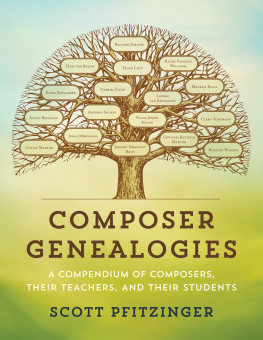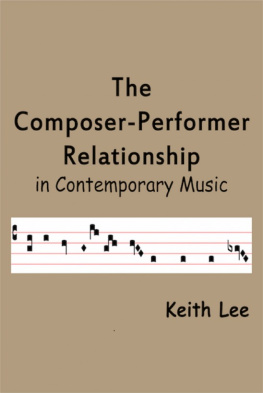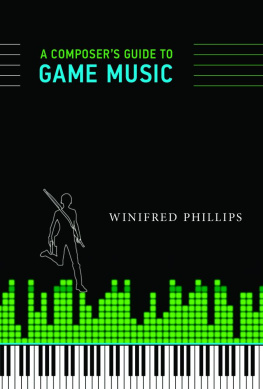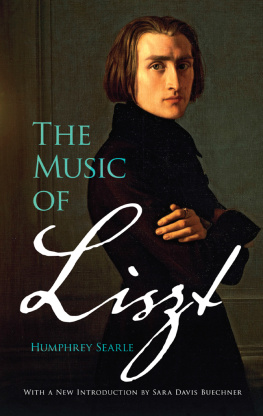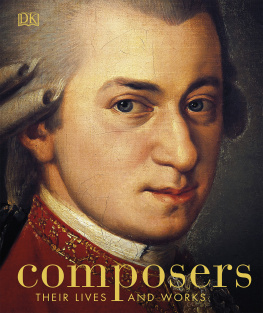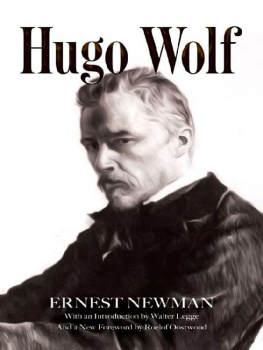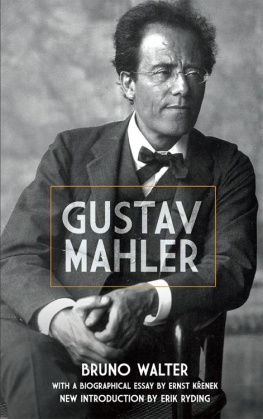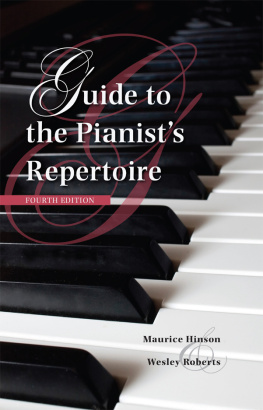Scott Pfitzinger - Composer Genealogies a Classiccb
Here you can read online Scott Pfitzinger - Composer Genealogies a Classiccb full text of the book (entire story) in english for free. Download pdf and epub, get meaning, cover and reviews about this ebook. year: 2017, publisher: Rowman & Littlefield Publishers, genre: Religion. Description of the work, (preface) as well as reviews are available. Best literature library LitArk.com created for fans of good reading and offers a wide selection of genres:
Romance novel
Science fiction
Adventure
Detective
Science
History
Home and family
Prose
Art
Politics
Computer
Non-fiction
Religion
Business
Children
Humor
Choose a favorite category and find really read worthwhile books. Enjoy immersion in the world of imagination, feel the emotions of the characters or learn something new for yourself, make an fascinating discovery.
- Book:Composer Genealogies a Classiccb
- Author:
- Publisher:Rowman & Littlefield Publishers
- Genre:
- Year:2017
- Rating:4 / 5
- Favourites:Add to favourites
- Your mark:
- 80
- 1
- 2
- 3
- 4
- 5
Composer Genealogies a Classiccb: summary, description and annotation
We offer to read an annotation, description, summary or preface (depends on what the author of the book "Composer Genealogies a Classiccb" wrote himself). If you haven't found the necessary information about the book — write in the comments, we will try to find it.
Composer Genealogies a Classiccb — read online for free the complete book (whole text) full work
Below is the text of the book, divided by pages. System saving the place of the last page read, allows you to conveniently read the book "Composer Genealogies a Classiccb" online for free, without having to search again every time where you left off. Put a bookmark, and you can go to the page where you finished reading at any time.
Font size:
Interval:
Bookmark:
Composer Genealogies Composer Genealogies A Compendium of Composers, Their Teachers, and Their Students Scott Pfitzinger ROWMAN & LITTLEFIELD Lanham Boulder New York London Published by Rowman & Littlefield A wholly owned subsidiary of The Rowman & Littlefield Publishing Group, Inc. 4501 Forbes Boulevard, Suite 200, Lanham, Maryland 20706 www.rowman.com Unit A, Whitacre Mews, 26-34 Stannary Street, London SE11 4AB Copyright 2017 by Rowman & Littlefield All rights reserved . No part of this book may be reproduced in any form or by any electronic or mechanical means, including information storage and retrieval systems, without written permission from the publisher, except by a reviewer who may quote passages in a review. British Library Cataloguing in Publication Information Available Library of Congress Cataloging-in-Publication Data Names: Pfitzinger, Scott. Title: Composer genealogies : a compendium of composers, their teachers, and their students / Scott Pfitzinger. Description: Lanham : Rowman & Littlefield, [2017] | Includes bibliographical references.
Identifiers: LCCN 2016049733 (print) | LCCN 2016049946 (ebook) | ISBN 9781442272248 (hardback : alk. paper) | ISBN 9781442272255 (electronic) Subjects: LCSH: ComposersRegisters. Classification: LCC ML100 .P505 2017 (print) | LCC ML100 (ebook) | DDC 780.92/2dc23 LC record available at https://lccn.loc.gov/2016049733  The paper used in this publication meets the minimum requirements of American National Standard for Information SciencesPermanence of Paper for Printed Library Materials, ANSI/NISO Z39.48-1992. Printed in the United States of America To my own composition teachers, with special thanks to my wife and family, who patiently endured the many hours of research that were required Foreword: The Road When I was sixteen, having just conducted the premiere of my first orchestra piece with the local youth orchestra, I knew nobody in the music world outside of Wisconsin. My family was artistically inclined, but it was the 70s: my attorney father was scrambling to establish his law practice, and my mother had given up her fine art pursuits for a career as an advertising executive. What to do with the boy whom music had grabbed by the soul and yanked? My mother sent a letter to Leonard Bernstein, along with a cassette tape of my orchestra piece and a copy of the score.
The paper used in this publication meets the minimum requirements of American National Standard for Information SciencesPermanence of Paper for Printed Library Materials, ANSI/NISO Z39.48-1992. Printed in the United States of America To my own composition teachers, with special thanks to my wife and family, who patiently endured the many hours of research that were required Foreword: The Road When I was sixteen, having just conducted the premiere of my first orchestra piece with the local youth orchestra, I knew nobody in the music world outside of Wisconsin. My family was artistically inclined, but it was the 70s: my attorney father was scrambling to establish his law practice, and my mother had given up her fine art pursuits for a career as an advertising executive. What to do with the boy whom music had grabbed by the soul and yanked? My mother sent a letter to Leonard Bernstein, along with a cassette tape of my orchestra piece and a copy of the score.
She had learned somewhere that the maestros childhood piano teacher had become his private secretary, and that a letter sent to him would likely be seen first and passed along (or not) by her. Importantly, she addressed the envelope, and her cover letter, not to Bernstein but to Helen Coates, his teacher . Wise Miss Coates understood her famous pupil and recognized in my music nascent potential. She passed it along to the maestro. He listened to it, and, with characteristic generosity of spirit, wrote my mother a letter that said, in part, Your son is the Real Thing. He is a Composer.
A path had been identified, even a direction given: I think that Daron should study with my friend David Diamond at Juilliard. With that letter, Bernstein was transformed in our worldview from a two-inch-tall figure from an alternate reality twitching on the screen of our black-and-white Magnavox television into a person, a teacher . My road now had a beginning. There remained an intellectual disconnect for me between the life I was leadingcomposing and practicing six or seven hours a day, writing poetry, enjoying life as a midwestern kid at a Big Ten collegeand the life led by the likes of Bernstein. I auditioned at Juilliard and was told that I was not yet ready, so I enrolled for two years at the University of WisconsinMadison, where I was first introduced, through conducting lessons with Catherine Comet, a pupil of perhaps western musics most influential twentieth-century music teacher, Nadia Boulanger, to the exacting standards that I would need to exceed, should my path be extended. Of course, Bernstein had known her, and had even transcribed her dying words: oral history .
I read in Atlantic Magazine that writer and composer Ned Rorem had been engaged to teach at the Curtis Institute and, on a hunch, applied. Ned invited me to study with himhe took on the role of teacher , I the protg . I hit the Road. But I was still entirely unprepared for the psychological impact that standing in the common room of the Curtis for the first time had on me. I was like a minor-league baseball player handed a bat at Shea Stadium. The enormity of not just my good fortune but also the responsibility that I had been given to swing for the bleachers, for, should I actually connect with the ball, everyone in the music world could, potentially, be in the stands, and see it fly out of the park and into history.
Thats why we study with teachers, and why the oral history passed along in lessons is the good stuff. Ned used to tell me about working for his teacher Virgil Thomson; a decade later, there I was, working for Virgil at the same table Ned once did, looking out over Manhattans Upper West Side from his apartment at the Chelsea Hotel. And then, after Curtis, Juilliard, and studies with Diamond, and analyzing the Rite of Spring with him from a score with Stravinskys own markings in it from when he went through it with David. And then, sitting next to Bernstein at his home at the Dakota on the piano bench, playing and singing my first opera for him, the maestro pointing out the passages that reminded him of Aaron Copland and Marc Blitzstein. The Road behind me was clear: Boulanger, Copland, Bernstein, Rorem, Lukas Foss and Diamond, me. I never lost sight of who I was.
It had always been me on the Road. But these men had set me on it, kicked me, shoved me, helped me, and hurt me. The way ahead was my Road. Thirty-five years later, their voices are still with me, as my voice will echo faintly in the ears of the hundreds of students Ive taught. It was always about the Road. Think of this book as a map.
Daron Hagen Introduction In music, as in any other discipline or society, there are successful professionals, regular hard-working members, amateurs, dilettantes, and failures. When a musician has studied with a successful performer or composer, it is not unusual for the musician to use that relationship to help establish his or her credentials. After all, even if a student ends up rejecting the methodology or ideology of a teacher, that teacher has undoubtedly left some impact on the student. This is why violinists, pianists, composers, and many others may refer to themselves as part of the school or lineage of a particular musician. The idea for this book first came to me through the combination of several ideas and conversations after I started grad school for composition. I learned that one of my composition teachers had studied with Aaron Copland, and I said, That sort of makes Copland my compositional grandfather, doesnt it? One of my other composition professors said that he had traced his compositional lineage all the way back to Tartini, which broadened my idea of composer influences and the lineage of teachers.
These discoveries caused me to examine how Copland and others may have influenced my teachers and how that may have been passed on to me, which naturally led to examining the bigger picture and how I fit into the compositional family. How did my teachers teachers influence them? And their teachers? And further back? If I am a compositional descendant of Beethoven or Mahler or Widor or Chadwick, has their compositional style affected me? Can I see it in how I write or the types of pieces I choose to compose? Another example might be Richard Strauss, who taught Alberto Franchetti, who taught Michael Schelle, who taught Frank Felice. The last two were both my teachers, and there is a noticeable tendency all the way down to write orchestral music using large ensembles and dense, highly chromatic instrumentation. This way of thinking can easily drive composers to begin more closely analyzing the music of their predecessors, examining the various traits of those composers writing. When learning how a teachers teacher wrote music, it can be a revelation when composers discover that they are using similar techniques or characteristics, like typical chord progressions or tonalities, how thickly the instrumentation is scored, or even favoring certain instruments. As David Conte wrote in a eulogy for Conrad Susa, Artists may or may not have children, but in the words of Plato, they produce eternal progeny.
Next pageFont size:
Interval:
Bookmark:
Similar books «Composer Genealogies a Classiccb»
Look at similar books to Composer Genealogies a Classiccb. We have selected literature similar in name and meaning in the hope of providing readers with more options to find new, interesting, not yet read works.
Discussion, reviews of the book Composer Genealogies a Classiccb and just readers' own opinions. Leave your comments, write what you think about the work, its meaning or the main characters. Specify what exactly you liked and what you didn't like, and why you think so.

